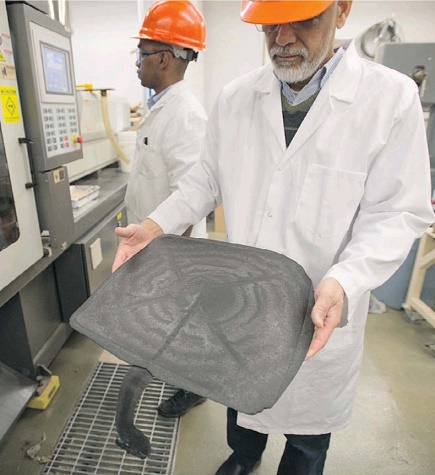
Research
The 21st century calls for more effective use of our natural resources not only by preprocessing them but by adding further value to keep Canada in a leadership role in the industrial world. CBBP has been at the forefront in conducting multidimensional research motivated by dedication to environmental sustainability and industrial efficiency.
A variety of research themes are being extensively pursued in our labs including bio-nanotechnology. CBBP is working on the development of next generation energy efficient lightweight performance nanomaterials for industrial applications including aerospace, automotive, bio-medical and electronics. Some of our dedicated researchers are also working on solving challenges faced by Canadian Pulp and Paper industry. Focusing on improving the cost effectiveness and sustainability of the biorefinery system include themes such as transformation of residual biomass from the pulp and paper industry into useful chemicals and composites. Furthermore, our esteemed researchers are exploring the utilization of bio-based raw materials such as cellulose fibers, vegetable oil, rubber, and starch in commercial and industrial applications for a green and prosperous future.
Bionanotechnology
Bio-inspired transformation of glucose and other enzyme derived biochemicals are the fore-front of Prof. Sain’s bionanotechnology platform with focus in biocatalysis. His work focuses on how enzymes and other protein derived micro-machines deliver function properties such as thermal and electrical conduction, self-breathing, self-healing and light emitting properties by their controlled intra-cellular and extra-cellular growth in a nutrient rich environment. By controlling size, phase, source and functionality these enzyme molecules have shown to demonstrate unique characteristics that are comparable to advanced materials such as super conductors, size nano-pore separation membranes, barrier materials, biopolymers, super strong fiberous material, shock absorbers and many more. Application of enzyme derived devices in sensing, thermal and electrical conductors, self-healing biomaterials, large molecule and small molecule derivation from natural materials, hydrogels and many others are the focus of his research theme.
Bio-inspired Advanced Materials
Carbon-dioxide derived advanced materials are key focus of this theme. One of the focus area is to develop rapid prototyping technology using 3D printing in all bio-derived structural composite platform. In this theme, team not only work on deriving carbon dioxide based composite platform by catalytically (photocatalytic or solar) converting CO2 to methanol to obtain monomeric platform but also using carbon-dioxide as a gas phase reactant in bubble nucleation and foam-core bi-layered structural carbon materials. For example, 3D printed lightweight duct for aerospace interior heat management system requires structural but all renewable natural nanomaterials as a core system with shell structure being derived from CO2 nucleated performance polymer foam in a one step process. Understanding thermodynamic and visco-elastic behavior of these novel materials are key to high through put and cost effective production of numerous mobility system components. Researching fundamental properties of fluid flow, reaction kinetics and thermodynamic properties are key focus of this theme.
Functional and Lightweight Carbon/Biocarbon Materials
Prof. Sain’s team is working on the development of next generation energy efficient lightweight performance and functional nanomaterials by exploring catalytic conversion of biomass to layered structure of biocarbon derived from forest and agro-residues for industrial applications including aerospace, automotive, bio-medical and electronics. Transformation of naturally occurring carbon to graphite structure under controlled environment can not only lead to nanolayered graphene materials but also provides extra-ordinary functional properties such as biocarbon dots for lighting devices, super capacitor properties for energy devices and thermally conductive properties for heat management. His research is dedicated to understanding the underlying physico-chemical and morphological interaction of biocarbon materials in macro-, micro- and nano- structured biomolecular forms.
Our research projects are categorized into four distinct research areas:
- Bio-plastics Research and Development
- Cellulose Based Micro and Nano Composite Technology
- Industrial Biomaterials and Biocomposites Manufacturing
- Biomass Technology – Value-added Utilization of Residual Biomass & Biochemicals